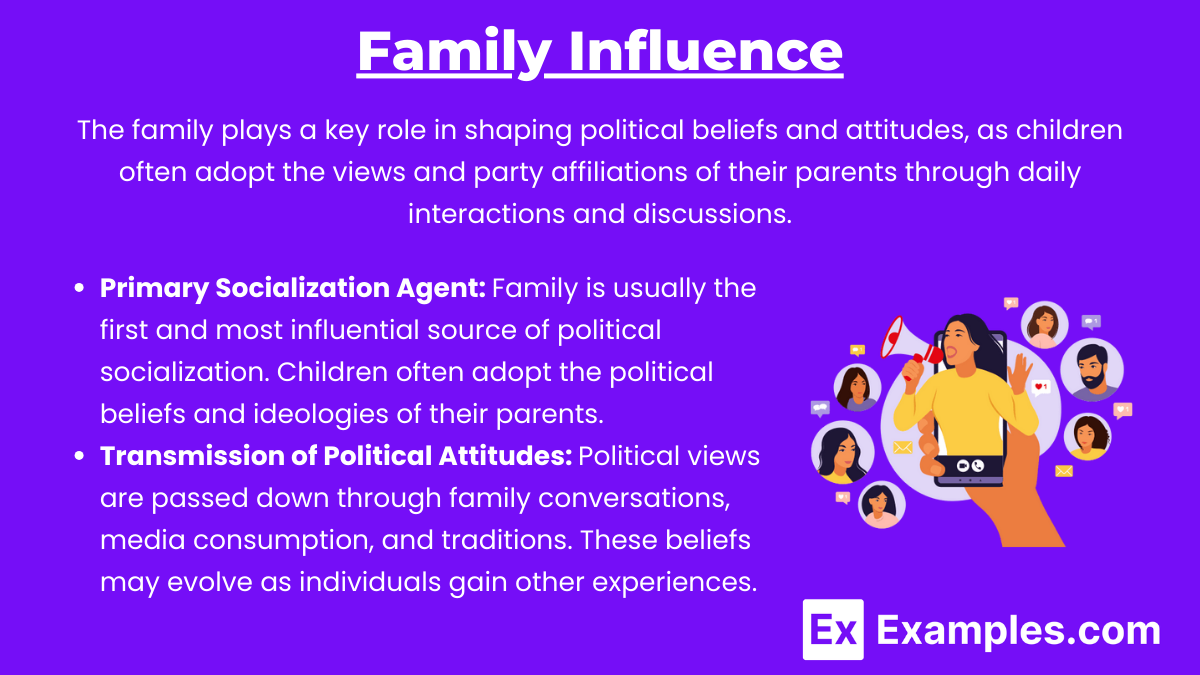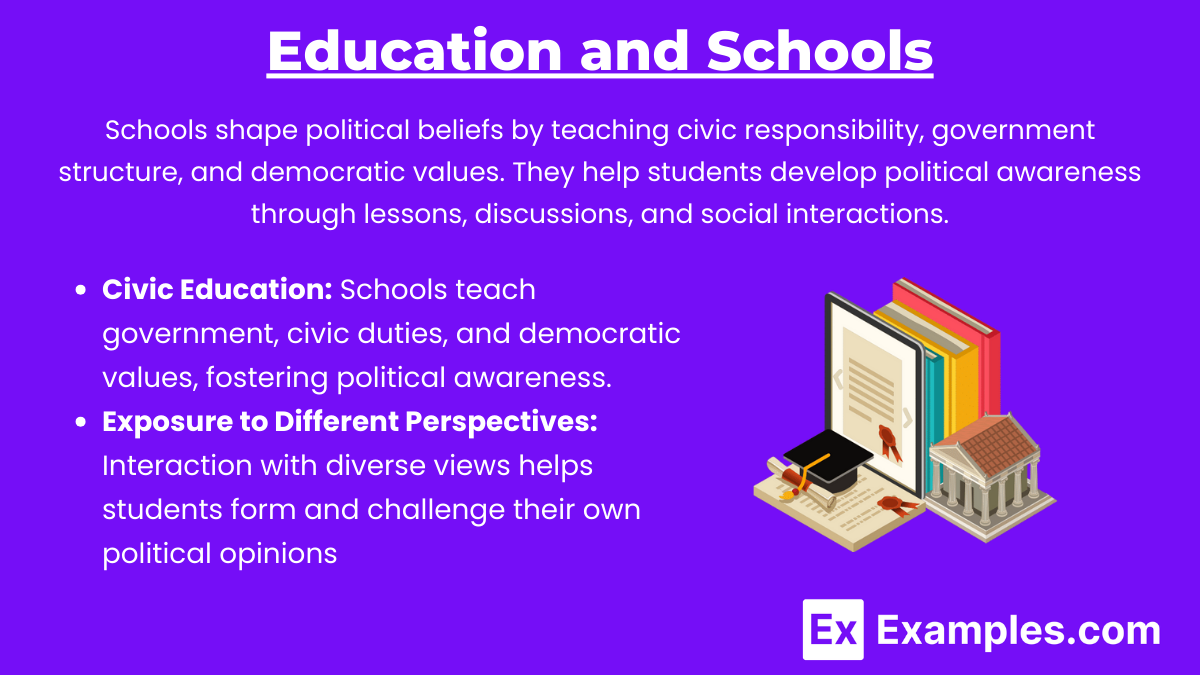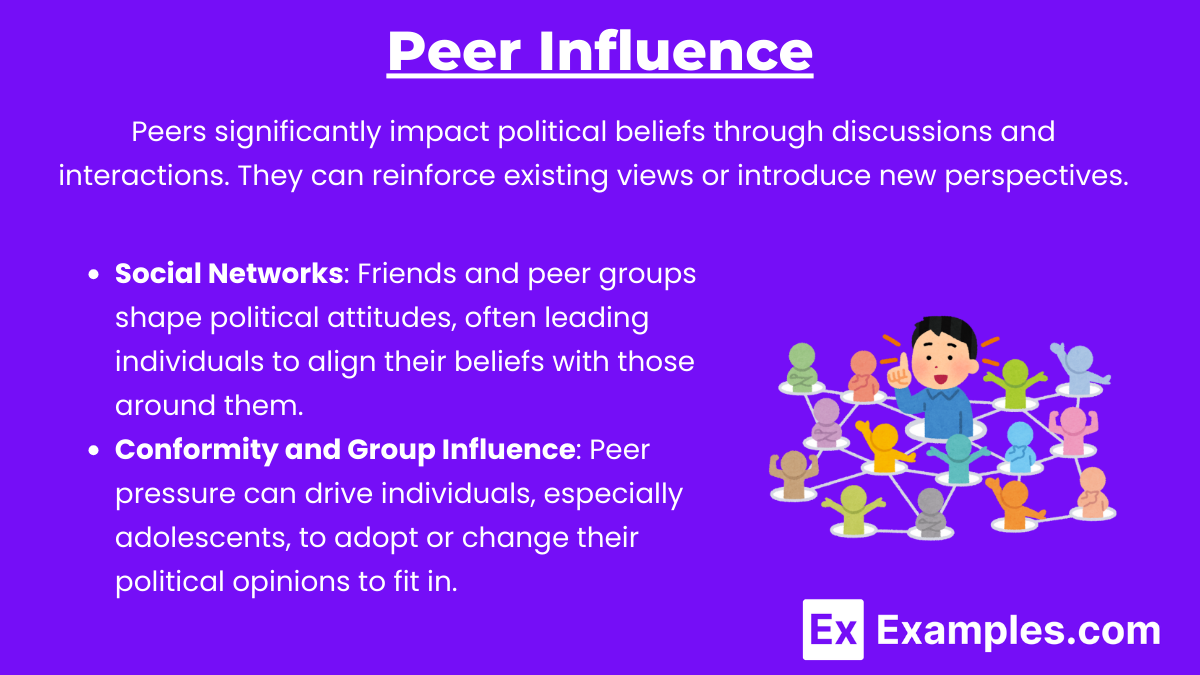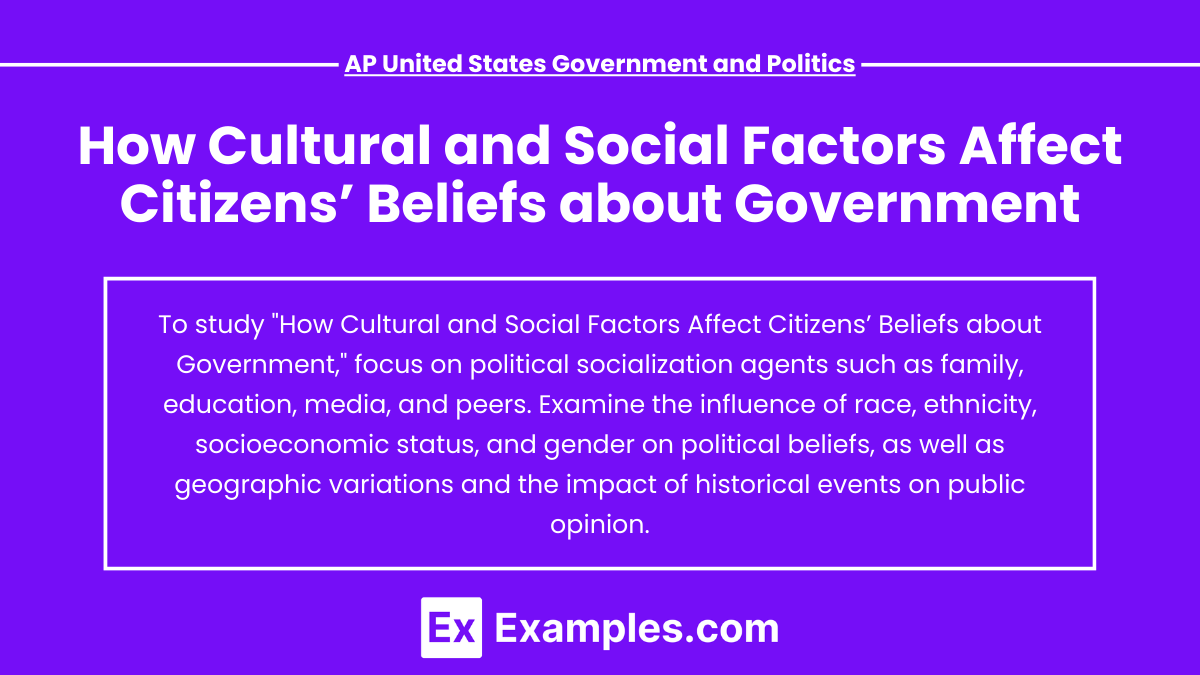Cultural and social factors play a crucial role in shaping citizens’ beliefs about government. Through agents like family, education, media, and peer groups, individuals form their political ideologies and values. These influences can lead to significant differences in how various demographic groups perceive government roles, policies, and political engagement. Understanding these dynamics is essential for analyzing political behavior and public opinion, especially in a diverse society like the United States, where varying backgrounds contribute to a rich tapestry of political beliefs.
Free AP United States Government and Politics Practice Test
Learning Objectives
In studying "How Cultural and Social Factors Affect Citizens’ Beliefs about Government" for the AP United States Government and Politics exam, students will learn to identify key agents of political socialization, such as family, education, media, and peers, and their roles in shaping political beliefs. They will assess how family dynamics influence ideologies, the impact of education on civic knowledge, and how media affects public perceptions of government. Additionally, students will investigate the influence of race and ethnicity on political identities, the role of socioeconomic status in shaping views on government policies, and gender dynamics in political beliefs. Geographic variations will also be examined, highlighting regional differences in attitudes.
Citizens’ political beliefs and attitudes about government are shaped by various cultural and social factors. These influences form the foundation of political socialization, which refers to the process by which individuals acquire their political values, beliefs, and ideologies. Understanding these influences is critical for success in the AP United States Government and Politics exam.
1. Family Influence

The family plays a key role in shaping political beliefs and attitudes, as children often adopt the views and party affiliations of their parents through daily interactions and discussions.
Primary Socialization Agent: Family is often the first and most influential agent of political socialization. Children typically adopt the political beliefs, party affiliations, and ideologies of their parents or guardians.
Transmission of Political Attitudes: Through conversations, shared media consumption, and family traditions, political views are passed down. Over time, individuals may either retain these beliefs or evolve them based on other experiences.
2. Education and Schools

These are institutions where individuals, especially children and young adults, learn knowledge, values, and social norms. Schools play a key role in shaping students' understanding of government, politics, and civic responsibilities. Through formal education, students are exposed to political systems, history, and democratic principles, helping them develop their political beliefs and attitudes.
Civic Education: Schools are crucial in teaching students about government structure, civic duties, and democratic principles. Civics classes, history lessons, and extracurricular activities such as debate clubs foster political awareness.
Exposure to Different Perspectives: As students engage with peers and teachers who hold diverse political views, their political identities are often influenced and challenged. Schools promote critical thinking, encouraging students to develop their own opinions about political issues.
3. Peer Influence

Peer influence refers to the impact that individuals' friends, classmates, or social groups have on shaping their behaviors, beliefs, and attitudes, including political views. Through discussions, shared experiences, and group dynamics, peers can reinforce or challenge one's political opinions and ideologies.
Social Networks: Friends, colleagues, and peer groups can significantly impact political attitudes. Individuals may adapt their beliefs to align with those around them, especially in close-knit social circles.
Conformity and Group Influence: Peer pressure and the desire to fit in may lead individuals to adopt or modify political opinions, especially during adolescence and early adulthood.
4. Media

Media encompasses various platforms, including television, newspapers, and social media, that disseminate information and influence public opinion. It plays a vital role in shaping political beliefs, providing news coverage, and framing political issues.
Traditional Media: Newspapers, television, and radio remain influential in shaping political beliefs, often providing citizens with their primary source of political information.
Social Media: Platforms such as Twitter, Facebook, and Instagram have become critical in disseminating political content. Social media can create echo chambers where users are exposed primarily to viewpoints that reinforce their existing beliefs, or it can introduce diverse perspectives.
Influence of News Framing: How media outlets frame political issues can affect public opinion. The choice of language, focus on certain events, or omission of others can influence how citizens perceive governmental actions and policies.
5. Religion

Religion refers to a system of beliefs, practices, and values centered around spiritual or supernatural elements. It often influences individuals' moral frameworks, community bonds, and worldview, including their political attitudes and behaviors. Religious beliefs can shape opinions on social issues, policies, and governance.
Moral and Ethical Beliefs: Religious institutions often play a key role in shaping political views. Citizens may align their political beliefs with the teachings of their religious traditions, particularly on issues related to morality, justice, and human rights.
Churches and Political Mobilization: Religious organizations can also influence political behavior by endorsing certain political candidates or policies, encouraging voter turnout, or engaging in lobbying efforts.
Examples
Example 1 : Family Influence
Families often serve as the first and most significant source of political socialization. Children typically adopt their parents' political beliefs, values, and party affiliations. For instance, if parents engage in political discussions, attend rallies, or vote regularly, their children are more likely to develop similar habits and beliefs. This transmission of values can lead to generational patterns in political party loyalty and ideological alignment.
Example 2 : Education and Schools
Educational institutions play a crucial role in shaping political beliefs. Civics education teaches students about government structure, rights, and responsibilities. For example, students exposed to comprehensive civic education may develop a stronger understanding of democratic principles and become more engaged citizens. Additionally, interactions with diverse peers in school can challenge students’ views, encouraging them to form their own political opinions.
Example 3 : Media Influence
The media landscape significantly impacts how citizens perceive government and political issues. Traditional media sources like newspapers and television provide information, while social media platforms can amplify certain narratives. For instance, individuals who primarily consume news from partisan outlets may develop skewed perceptions of political events. This selective exposure can reinforce existing beliefs and create divisions based on differing media consumption.
Example 4 : Race and Ethnicity
Racial and ethnic backgrounds profoundly influence political attitudes. Shared experiences within racial or ethnic communities often lead to collective political beliefs. For example, many African Americans and Latinos in the United States tend to prioritize civil rights and social justice issues, which can affect their voting patterns. These shared identities can lead to a stronger sense of solidarity and mobilization around specific political causes.
Example 5 : Economic Status
An individual's economic background significantly shapes their views on government intervention and policy priorities. For instance, wealthier citizens may advocate for lower taxes and limited government regulation, believing that free markets drive economic growth. In contrast, those from lower-income backgrounds may support policies that promote social welfare and economic assistance, reflecting their direct needs and experiences with government programs. This divergence in priorities often leads to differing opinions on the role of government in economic affairs.
Multiple Choice Questions
Question 1:
Which of the following is the most significant factor in shaping a person's political beliefs during childhood?
A) Social Media
B) Education
C) Family
D) Economic Status
Correct Answer: C) Family
Explanation: Family is often the primary agent of political socialization for children. The political beliefs and values instilled by parents significantly influence a child's understanding of government and politics. Discussions about political issues, voting behaviors, and party affiliations typically begin at home, making family the most critical factor during early development.
Question 2:
How does education impact citizens’ beliefs about government?
A) It restricts exposure to diverse viewpoints.
B) It provides individuals with a basic understanding of democratic principles.
C) It discourages civic engagement.
D) It solely focuses on historical facts without context.
Correct Answer: B) It provides individuals with a basic understanding of democratic principles.
Explanation: Education, particularly civics education, equips students with knowledge about government structures, rights, and responsibilities. This foundational understanding encourages civic engagement and helps individuals form informed political opinions. In contrast, a lack of education can limit awareness and understanding of political processes.
Question 3:
Which cultural factor is most likely to create a shared sense of political identity among a group of citizens?
A) Media Consumption
B) Racial and Ethnic Background
C) Geographic Location
D) Economic Status
Correct Answer: B) Racial and Ethnic Background
Explanation: Racial and ethnic backgrounds often shape collective experiences and political beliefs, leading to a shared sense of identity among group members. For instance, marginalized groups may unite around issues of social justice and civil rights due to common experiences with discrimination. This collective identity can significantly influence voting patterns and political engagement.


